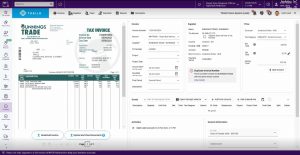From Manual to Magical: How ERP Automation Transforms Businesses
Welcome to Episode 2 of The Digital Roast, where we explore how automation is reshaping the way Kiwi businesses operate. In this episode, Ranae Dodds, Christchurch Branch Manager and ERP Business consultant, takes the mic to host a conversation with two experts: Anne Howie, a specialist in AP automation, and Alex Ball, a seasoned technical consultant. Together, they unpack how ERP automation is helping businesses move from manual, paper-heavy processes to streamlined, secure, and scalable systems.
Watch the latest episode on YouTube:
or listen on Spotify:
Introduction
ERP automation is no longer just a buzzword — it’s a practical solution for businesses drowning in paperwork, duplicate data entry, and month-end chaos. Whether you’re processing 200 or 3,000 invoices a month, automation can dramatically reduce time, errors, and stress.
Anne and Alex share how automation is not just about saving time — it’s about empowering staff, improving accuracy, and enabling businesses to focus on what really matters. From invoice approvals to freight and website integrations, automation is helping businesses work smarter, not harder.
Common Inefficiencies
Manual processes are still surprisingly common — and costly. Anne highlights two major pain points in accounts payable:
- Chasing invoice approvals through printed documents and email chains.
- Storing years of paper records in overflowing back rooms and containers.
Alex adds that double data entry is a widespread issue. It not only wastes time but also increases the risk of errors. These inefficiencies often go unnoticed until they start affecting customer service, reporting, or compliance.
Benefits of Automation
The rewards of automation are significant:
- Businesses save days — not just hours — each month by automating invoice processing.
- AP clerks experience less pressure and more job satisfaction as they shift from data entry to strategic tasks.
- Automation reduces accounting costs and shortens audit times by improving data consistency.
- With fewer errors, businesses can close their books faster and report to boards with confidence.
Anne notes that one client now completes month-end by the 10th — a huge improvement that’s freed up time for chasing overdue payments and improving cash flow. Traild platform
Traild platform
Real-Life Examples
Alex shares a powerful story from the primary industry: a client grading thousands of products per season used to manually calculate supplier payments. With automation, they now generate thousands of invoices with a single click — a process that once took days.
Anne describes how clients who once relied on folders of paper now enjoy seamless digital workflows. Automation has helped them not only reduce errors but also detect potential fraud and improve compliance.
Future Outlook
Looking ahead, automation is becoming more intelligent and secure. Anne explains how modern systems now include:
-
Built-in fraud detection and red flag alerts
-
Access to national databases to verify suppliers and bank accounts
-
Segmented workflows to prevent internal fraud
Key Takeaways:
-
Automation is for any business with repetitive, rule-based processes – not just large enterprises
-
Common inefficiencies like double entry and paper-based approvals are ripe for automation
-
The Benefits go beyond time savings – they include better data, happier staff, and stronger financial outcomes
-
Start small, validate the process, and scale with confidence
-
The future of ERP is smarter, safer and more connected
References:
Services for everybody – Focus Technology
ERP Systems – Focus Technology
Interested in exploring ERP for your business?
Talk to our team today and discover how we can help simplify your systems and drive smarter growth.
